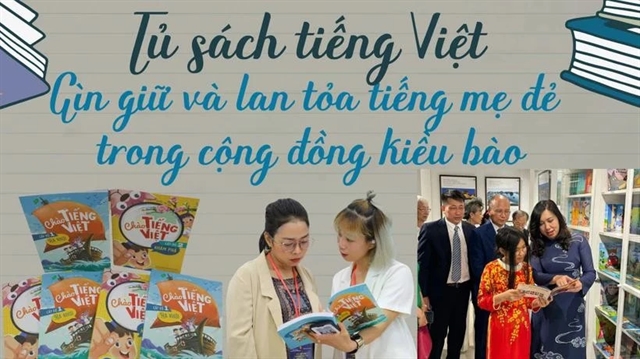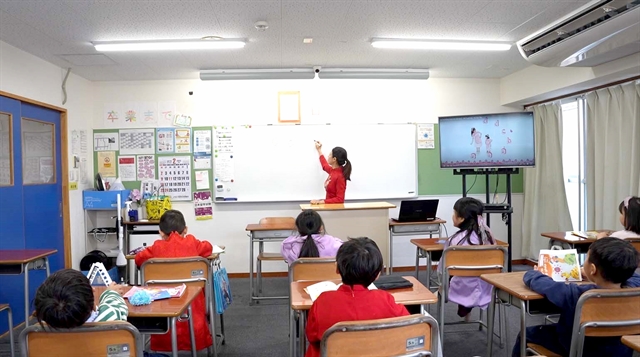 Life & Style
Life & Style

 |
| A Vietnamese language lesson at the Đại Việt Language and Culture Academy. — VNA/VNS Photo Nguyễn Tuyến |
HÀ NỘI — Located in the centre of Fukuoka City in Japan, a school called Đại Việt Language and Culture Academy is where every weekend, Vietnamese children living in the city learn their mother tongue and experience the beauty of their homeland's culture.
On the first days of the Lunar New Year, Principal Nguyễn Duy Anh, teachers and parents organised a special event featuring traditional customs such as giving lucky money and offering good luck wishes.
That day, the Vietnamese language class started with stories about Tết in Việt Nam.
The students were very excited, and using their newly-learned Vietnamese, they tried to explain that they really like the traditional Tết customs, including tasting dishes such as chưng cake and jam.
Towards the Homeland
A space imbued with the language and culture of his homeland in Fukuoka was the wish of Nguyễn Duy Anh, who turned that dream into reality in 2019.
With the sponsorship of the Consulate General of Việt Nam in Fukuoka, Anh and other dedicated Vietnamese established the Đại Việt Language and Culture Academy, located at the GAG Japanese Language Academy.
In the early days, the Đại Việt Academy had only one class with eight students and three volunteer teachers.
Then, the COVID-19 pandemic occurred, and due to quarantine regulations during this period, the school's activities had to be temporarily suspended.
When the pandemic passed, determined to rebuild the Vietnamese school, Anh and his friends worked together to reopen the model 'My Vietnamese' in 2023, with two classes in Hakata District: one for children five years and older and another for younger children.
With limited funding, the school's teachers are still only teaching as volunteers.
Therefore, the Đại Việt Academy hopes to receive support and cooperation of parents, the Vietnamese community and local authorities, to not only maintain long-term classes but also to introduce Vietnamese culture to Fukuoka.
For teachers at the school, the current difficulty is finding a suitable curriculum for Vietnamese children in Japan.
Teacher Phương Anh said that due to the hieroglyphic nature of the Japanese language, the Vietnamese alphabet, which belongs to the Latin alphabet system, is extremely new and difficult for children to adapt to.
In addition, Vietnamese writing has many curved strokes, so the Parents' Association agreed to teach children lowercase letters, helping them remember letters more easily.
Those lowercase letters are introduced in parallel to the Japanese class so that the children can know letters and practice them later.
The Vietnamese bookshelf located at the school also helps students access Vietnamese texts even after class hours.
The bookshelf was opened on August 20, 2023 and was the first Vietnamese bookshelf for overseas Vietnamese, providing materials for students and teachers in Fukuoka.
Anh affirmed that the bookshelf is a valuable source of materials, promoting love and pride in the Vietnamese language within the Vietnamese community in Fukuoka.
Parents’ Association
For parents, the schedules of classes, sports events and weekend catch-up classes at Japanese high schools are different, causing many interruptions in their children's studies.
Therefore, teachers and parents established a Parents' Association for teachers and parents to work on how to incorporate language learning with extra activities.
Nguyễn Thế Vinh, a parent whose child is studying at the My Vietnamese class, said he wanted his child to learn the language to preserve the motherland and connect with family members in Việt Nam.
Students have come to see the Đại Việt Academy as both an environment for them to practice what they have learned and a 'common home' for Vietnamese families in Fukuoka to unite and build a strong community in Japan.
Principal Anh said that together with dedicated people and the support of the Vietnamese Consulate General in Fukuoka, he was nurturing plans to build a teacher team this year and online lesson plans to open more classes for families far from the centre.
Anh is passionate about the community and holds many positions such as being a member of the Việt Nam Fatherland Front Central Committee and Chairman of the Vietnamese Association in Fukuoka.
His primary driver is to preserve the language for generations of Vietnamese children born and raised in Japan, considering it the foundation for maintaining a united Vietnamese community that always looks towards the homeland.
He plans to expand the 'My Vietnamese' class model to other districts in Fukuoka Province as well as neighbouring provinces to meet the wishes of many families who want to preserve a seamless connection with Việt Nam. — VNS




